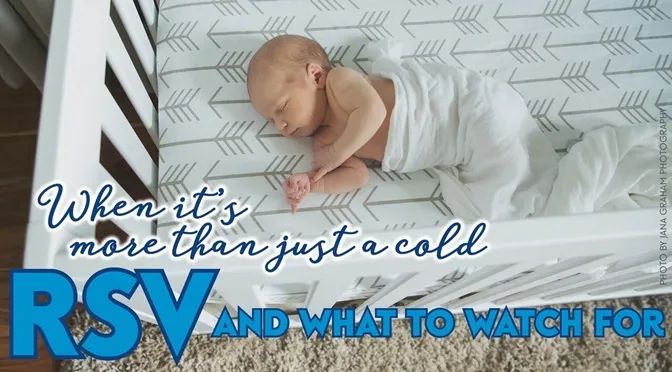
RSV and what to watch for
Originally printed in the pages of Simply Family Magazine’s February 2017 issue. Never miss an issue, check out SFM’s digital editions, here!by Angela Douglas
Wintertime is great for building snowmen, sledding, and drinking hot cocoa. Unfortunately, the cold weather is also great for putting us under the weather. The dreaded cold and flu season tends to arrive right as we’re wrapping up the holidays and excitedly embarking on a new year. While most of us squeak by with just a cold or two, this time of year can be especially hard on the smallest members of the family.
It’s important to know what symptoms you need to be watching for when your kiddo’s sniffles turn into something more. Respiratory Syncytial Virus (RSV) is a respiratory virus that infects the lungs and breathing passages, and affects almost all children by their second birthday.
“RSV is pretty common. Its symptoms are much like that of the common cold – runny nose, low-grade temperature, cough, irritability,” explained Dr. Sarah Stewart, MD, St. Vincent Family Physicians- North Shiloh Family Medicine. “The difference is when it turns into more of a respiratory issue; breathing more quickly, struggling for air.”
Symptoms parents should be on the lookout for:
- Nose flaring
- Rapid breathing
- Struggling to breathe
- Wheezing
- Grunting
- Movement in the muscles between the ribcage
Dr. Stewart also advised that anytime your child has a temperature over 101.5 degrees, they need to be seen by a health care provider.
RSV symptoms typically develop on day two or three, worsen from days three to five, and start to improve after that. Hospitalization may be required if oxygen treatments are needed.
“Thankfully, most kids don’t end up needing to be hospitalized,” Dr. Stewart pointed out. “The symptoms can usually be managed at home.”
Home remedies for relief:
- Proper suctioning of mucous from nose
- Keep them hydrated
- Use a cool mist humidifier
- Dress them in light clothing
- Give them acetaminophen or ibuprofen for low-grade fever
People of all ages can contract RSV, but those most at risk are premature infants, children younger than one year of age, children with congenital heart or chronic lung disease, and children with weakened immune systems due to a medical condition.
RSV is transmitted through respiratory droplets and spreads from direct or indirect contact with an infected person. The virus can survive on hard surfaces – like tables, doorknobs, and shopping carts – for many hours, so it’s a good idea to use sanitizing wipes and/or hand sanitizer while in public.
“If you can leave your child at home while you run an errand, do so. Prevention is the best tool you have,” encouraged Dr. Stewart. “Whatever you can do to minimize exposure is highly recommended, especially if you have a baby under a year old.”
The Centers for Disease Control and Prevention reports research is being done to develop RSV vaccines, but none are available yet. So, like with most viruses, you just have to let it run its course and try to keep your child as comfortable as possible until they start to feel better.
“It’s important to be patient. As parents, it’s tough to see our kiddos sick but take comfort in knowing that they’ll likely have a full recovery within a week or two,” said Dr. Stewart. “However, a parent’s intuition is very important. If you think something isn’t quite right and you have concerns about your child’s health condition, have them checked out by your health care provider.”
about the author...Angela has lived in Billings for eight years and considers herself a Montana enthusiast! She enjoys being active and exploring the great outdoors with her husband Miles, and 1-year-old son Dylan. As a new mom, Angela loves seeing the world through her kiddo's eyes and is learning to pause and soak up all of the little things.
